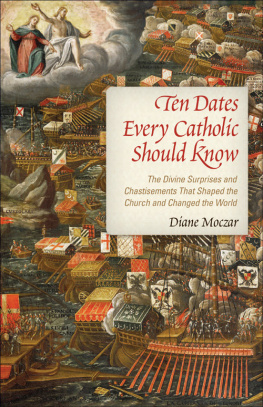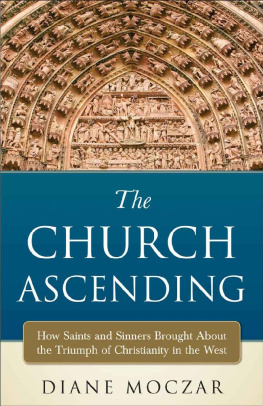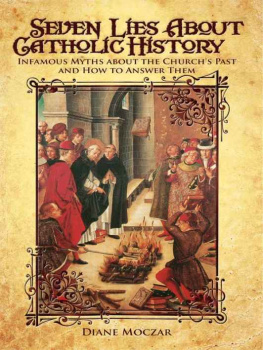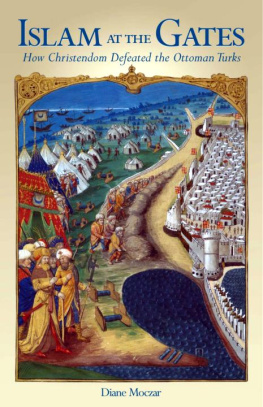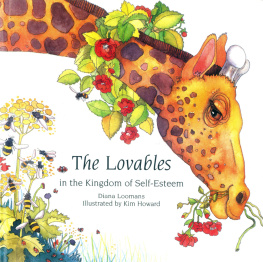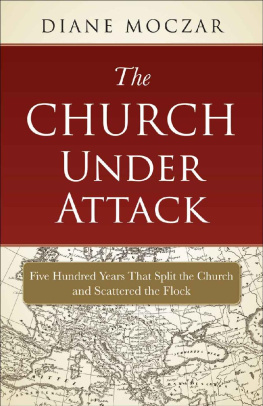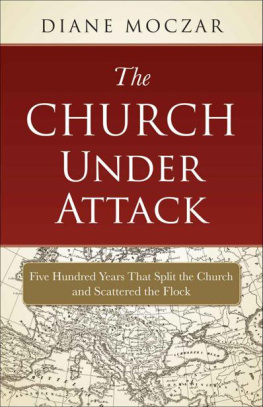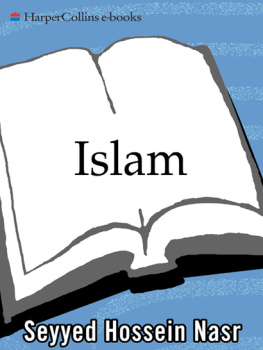Diane Moczar - Islam at the Gates
Here you can read online Diane Moczar - Islam at the Gates full text of the book (entire story) in english for free. Download pdf and epub, get meaning, cover and reviews about this ebook. year: 2008, publisher: Sophia Institute Press, genre: Religion. Description of the work, (preface) as well as reviews are available. Best literature library LitArk.com created for fans of good reading and offers a wide selection of genres:
Romance novel
Science fiction
Adventure
Detective
Science
History
Home and family
Prose
Art
Politics
Computer
Non-fiction
Religion
Business
Children
Humor
Choose a favorite category and find really read worthwhile books. Enjoy immersion in the world of imagination, feel the emotions of the characters or learn something new for yourself, make an fascinating discovery.
- Book:Islam at the Gates
- Author:
- Publisher:Sophia Institute Press
- Genre:
- Year:2008
- Rating:3 / 5
- Favourites:Add to favourites
- Your mark:
- 60
- 1
- 2
- 3
- 4
- 5
Islam at the Gates: summary, description and annotation
We offer to read an annotation, description, summary or preface (depends on what the author of the book "Islam at the Gates" wrote himself). If you haven't found the necessary information about the book — write in the comments, we will try to find it.
Islam at the Gates — read online for free the complete book (whole text) full work
Below is the text of the book, divided by pages. System saving the place of the last page read, allows you to conveniently read the book "Islam at the Gates" online for free, without having to search again every time where you left off. Put a bookmark, and you can go to the page where you finished reading at any time.
Font size:
Interval:
Bookmark:


Also from Sophia Institute Press by Diane Moczar:
Ten Dates Every Catholic Should Know
DIANE MOCZAR
How Christendom
Defeated the Ottoman Turks
.. 3
...... 23
.... 43
...... 63
....... 83
........ 107
........ 123
............ 135
.......... 159
............ 185
........... 217
............... 237
........... 245
Muslim Aggression:
A Drama in Five Acts
On the Greek island of Santorini, monks secretly teach children religion and the Greek language - in defiance of their Turkish overlords. In the Balkans, parents desperately seek places to hide their little boys from Turkish kidnappers, who are coming with orders to fill their quota of captive children to send back to the sultan. On the Mediterranean, outnumbered Christian ships sail east to confront the Ottoman fleet in one of the great sea battles of history, while Christian princes struggle to put together a coalition army to take on the Turkish land forces. The popes repeatedly appeal for a new crusade, often in vain, and religious who have dedicated themselves to ransoming Muslim captives - even if at the cost of their own freedom - seek to save at least some of the multitude being taken for Turkish harems and slave labor. And the sultan's trusted general, an Albanian captive taken to the Ottoman court as a boy, abruptly changes sides during a crucial campaign and becomes the legendary leader of his people against the conquerors.
These are a few of the facets of what might be called "the anti-Jihad": the Christian resistance at all levels - from popes and priests, peasants and nobles, farmers and soldiers - in the face of the occupation of much of Christendom by Ottoman Turks from the fourteenth to the early twentieth century. The resistance was not universal; some Christians collaborated with the invaders. Neither was it perfectly executed; politics often interfered with the West's military response, and what might have taken only decades with a wholehearted effort took centuries instead. Still, it was successful. The huge Ottoman Empire, one of the most extensive the world had ever seen, was reduced to the area of present-day Turkey. This is the story of the most glorious period of that resistance: that of the fourteenth century through the seventeenth.
The conflict between Islam and the West that has been in progress for the last eleven hundred years and is still ongoing can be viewed as a drama - a tragedy - in five acts; each act includes several scenes performed by many players. In this perspective, we are living in Act Five. The subject of this book is Act Four. Obviously, entering a theater near the end of a play leaves the playgoer at a loss, since he does not know what went on in earlier acts. We will therefore have to spend a little time reviewing the first three acts of our drama before bringing up the curtain on the fourth. Without some knowledge of the mentality, attitudes, and behavior of the early Muslims, we will not understand the motivation and behavior of the Ottoman Turks when we get to them.
Act One: The Emergence of Islam
In the mid-seventh century, Arab converts to a new religion began leaving Arabia for neighboring territories, taking their new faith with them. Over the next two centuries they spread north, east, and west and much of what was then Christendom fell to them, including North Africa, Spain, Palestine, and Syria.
Seventh-century Arabia would seem at first sight to be an unlikely place to spawn one of the great world religions. The northern part of the peninsula had been sporadically under Roman control and still maintained contact with Byzantium and other states. The southern tip of the peninsula had been influenced, and perhaps controlled, by the ancient African civilization centered in Ethiopia. The Queen of Sheba (or Saba) may have come from an ancient city in what is now Yemen. On the other hand, much of the interior of the land was populated by various tribes, some of them Jewish and many of them Christian, though their Christianity was often an unorthodox variety associated with various sects. There was also a large number of nomads who were polytheists.
A New Chosen People
When a new religion burst upon the scene, emerging fullblown in the text of one book - the Qur'an - it produced a great impact among a people who had previously been illiterate. Although the Qur'an is a large book with numerous sections (the Suras), some of them narrative and many dealing with minute regulation of the individual and social lives of believers, the essence of the new religion is simple. It posits one God, Allah, the existence of angels and of prophets (Jesus being one of the latter), and heaven and hell. It mandates five simple practices (the "pillars"), which include the ritual profession of faith that "there is no god but Allah and Muhammad is his prophet," prayer five times a day, fasting during the month of Ramadan, almsgiving, and a pilgrimage to the city of Mecca once in a lifetime. Many other regulations are also included in the Qur'an, such as circumcision and (possibly aimed at the Catholic sacrament of the Holy Eucharist) abstinence from alcohol.
The Qur'an cites the Bible in many places, but distorts the biblical passages it quotes in order to convey a new message. Its author seems to presume, for example, that justification originally came through circumcision, and that since Abraham's son by Hagar, Ishmael, was circumcised first, it was with him (traditionally considered the ancestor of the Arabs) that God made His covenant rather than with Isaac. Based on this example and others, some experts - including Brother Bruno Bonnet- Eymard, the French specialist in Qur'anic studies - have argued that the Qur'an's author intended neither to modify Judaism or Christianity, nor to create a third religion totally different from them, but rather to abolish them, in a return to what he sees as the original covenant of God with Abraham and Ishmael. (It goes without saying that the Jesus who appears in the Qur'an is not divine.) Thus, for Muslims, the Arabs are truly the chosen people, descended from Abraham's chosen son, called to restore the Temple and conquer the world for the God of the original revelation.
Results of the First Preaching of Islam
What followed the early promulgation of this new doctrine is somewhat obscure. Within Arabia, the new religious ideas brought strife to the whole peninsula. The polytheists fought the new followers of the one God, Allah; the Jews resisted being ruled by the new sectarians and many were massacred. Many - perhaps most - of the Christians seems to have managed to coexist and maintain amicable relations with the Muslims as long as the new religion was confined to the Arabian Peninsula. Possibly a sizeable number were attracted to the new faith and converted, though I have seen no reliable estimates of numbers.
Font size:
Interval:
Bookmark:
Similar books «Islam at the Gates»
Look at similar books to Islam at the Gates. We have selected literature similar in name and meaning in the hope of providing readers with more options to find new, interesting, not yet read works.
Discussion, reviews of the book Islam at the Gates and just readers' own opinions. Leave your comments, write what you think about the work, its meaning or the main characters. Specify what exactly you liked and what you didn't like, and why you think so.



